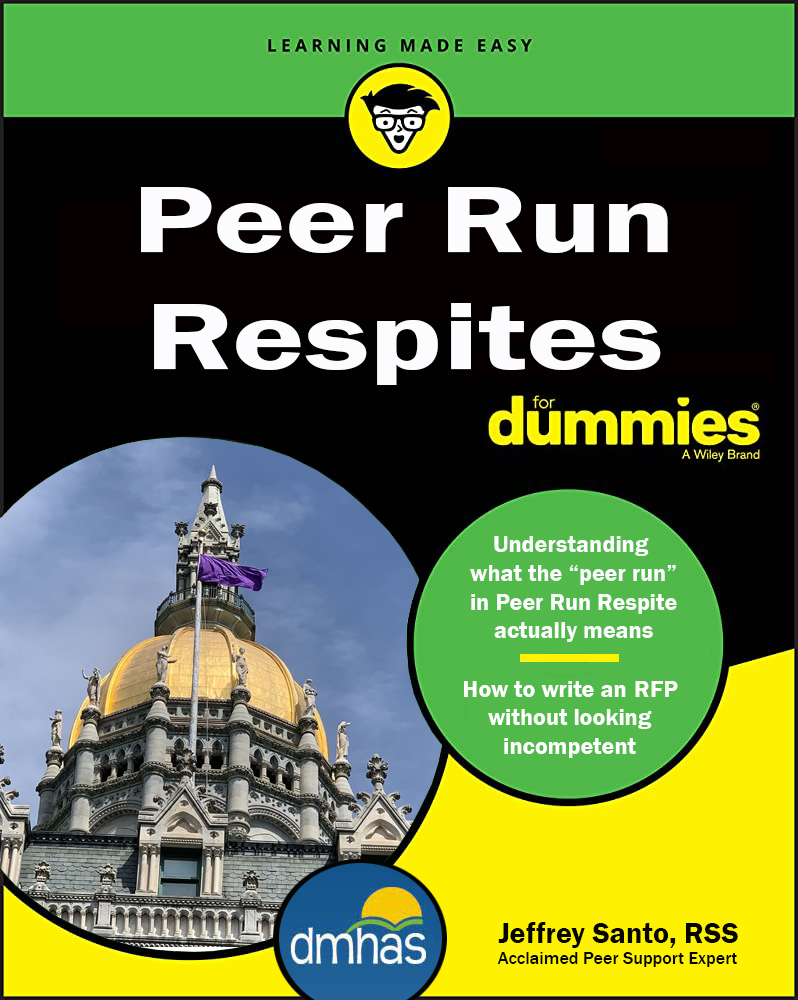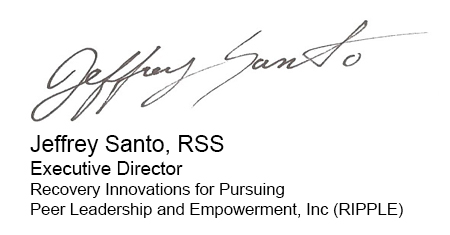
Some people have asked if we stopped publishing our quarterly newsletter, but we can assure you that is not the case. Usually, this would have been published in the first week of April. We opted to push it back to better reflect on the events in the spring months. The Karuna Conference hosted by Advocacy Unlimited, the Peer-Run Respite RFP put forward by DMHAS, Mental Health Awareness Month, and a letter we knew Ripple would soon send to Commissioner Navarretta.
The Karuna Conference took place on April 20-21 and was very well attended. It felt good walking through the door and seeing people in person again. It is hard to believe that so much time has passed since Covid disrupted our lives. The events description, “We are returning to our roots and explore voices, visions, and unique states of consciousness. We will elevate these experiences, and explore a meaning beyond the medical paradigm, together. Thank you for offering your time, energy, and presence to this year’s conference.”
The classes were interactive, and the keynote speakers were informative and entertaining. Breakfast and lunch were provided to get the day started and sustain us throughout the day. After our bodies were nourished, we had the opportunity for healing arts sessions. The incredible team at Toivo offered chair massage, reiki, and acupuncture to anyone wanting to sign up. This event was free of charge to anyone able to commit to attending the two full days. To help ensure Advocacy Unlimited can do this next year, they have set up a way to donate. You can get more information and a donation link on their website at: www.karunact.org. Thank you for supporting this fantastic experience!

There was also a dinner held on Thursday night for anyone wishing to sign up to attend. Jeffrey received a 2023 Community Spotlight Award for “Dedication and commitment to advancing the interests of the peer recovery community.“
Jeff said that throughout his life, he was part of many things, from church groups, Boy Scout troops, sports teams, and even a living history organization. But it was not until he discovered the peer movement did he find himself in what can be defined as a community. Adding that it has supported, encouraged, inspired, and sustained him.
“I can not thank everyone enough for being a part of my work and, more importantly, my life.” – Jeffrey

Page 1
Peer-Run Respite update: We’re unsure if there is an update on peer-run respite. The reason is that the request for proposal or RFP from DMHAS for a new respite in Connecticut completely misses the mark. In March of last year, DMHAS held two town hall meetings where peers sent a clear message, the quote published in a May 2023 Connecticut Mirror article, “We want peer respite, but it needs to be real peer respite rooted in established best practices and values.”
A traditional peer-run respite is a home-like environment. Most are in former single-family dwellings. The RFP that DMHAS has put forward is so restrictive they have even mandated the location, 401 West Thames Street, Norwich, CT, 06360. More than 100 people who attended the town hall meetings asked for a non-clinical model. Why did DMHAS choose the respite sight as the Southeast Mental Health Authority?
According to the DMHAS website, these are the current “respites” in our state, none of which are peer-run. It is also worth noting that the Southeastern Mental Health Authority already has a respite.
Community Health Resources (CHR)
Community Mental Health Affiliates (CMHA)
Continuum of Care – Bridgeport Crisis Respite
Continuum of Care – Crisis/Respite Program
Mercy Housing and Shelter Corporation
River Valley Services (RVS) – Respite
Rushford – Crisis/Respite Program
Southeastern Mental Health Authority (SMHA)
Western Connecticut Mental Health Network (WCMHN)
Yale-New Haven Hospital – Respite Bed Program
Continuum of Care – ASIST Respite
Continuum of Care – Jail Diversion Respite
Inspirica – Gilead Jail Diversion Respite
Western Connecticut Mental Health Network (WCMHN)
Continuum of Care – YAS Respite
Western Connecticut Mental Health Network (WCMHN)

Let us be very clear about this, if you build a respite, even if staffed by peers in a clinical environment; it is not what we asked for. It is not like this is some new, unproven concept that DMHAS needs to hash out. In 2017 the Wildflower Alliance handed them quite literally a blueprint on how it is done. A 67-page report was created to aid in launching Connecticut’s first peer respite, but it was, we don’t know, lost, maybe? If you look at recent history, DMHAS has a new trend of ignoring people with lived experience, which you can read more about in the open letter to the commissioner later in this newsletter.
RFP Summary. The Connecticut Department of Mental Health and Addiction Services is seeking proposals for a 24 hour/7 day per week/365 day per year, 6-bed Peer Respite Program (PRP). The PRP will be located at 401 West Thames Street, Norwich, CT, 06360. Admissions will take place during first and second shifts, 7 days per week from all regions in Connecticut and will be scheduled. Walk-in admissions are not anticipated. The PRP will provide a short-term, home-like, voluntary setting in the community, to individuals who identify experiencing emotional distress and/or urgent or emergent crisis. The PRP will employ individuals with lived experience who are Connecticut Certified/Trained Peer Specialists (i.e., trained and certified by Advocacy Unlimited or Hartford Healthcare or trained by CCAR). The PRP staff will utilize recognized best practice models such as the Intentional Peer Support Model or other comparable models, in order to assist individuals in resolving their mental health crisis, develop effective self-reliance skills, and restore their
Page 2
ense of hope and purpose. The PRP will support individuals in continuing to remain connected and engaged in the community by attending work, school, treatment programs, and/or participating in other activities and maintaining relationships. The PRP will offer individuals an opportunity to learn and grow through the development of mutual relationships with Connecticut Certified/Trained Peer Specialist staff who offer choices and honor each person’s capability for personal growth during their recovery journey. – Source, Evidence Based Practice Peer Respite Program – Request for Proposals (DMHAS-EBP-Peer Respite Program-2023) April 10, 2023.
Ripple’s open letter to Commissioner Navaretta:
Dear Commissioner Navaretta,
I know you have recently received correspondence regarding the RFP for peer respite from several advocates in our community. Since I have already signed onto that letter, I believe my feelings on that topic are already known to you. What I would like to talk to you about today is the future of peer support, peer certification, and peer involvement in the process of creating policy in our state.
As you may know, I served on the Peer Advisory Committee assembled in the collaborative effort between DMHAS, PRCH, and Yale. You may also know that I was not initially selected for that project and was added to the team later. I was invited after pointing out that the committee, as it stood at the time, was missing a few key stakeholder demographics. Everyone selected had a higher level of education (beyond high school), no one identified as living at or below the poverty line, and most importantly, everyone was making a living working in the mental health and addiction services system. Advocating for the underdog, for people in situations like mine, earned that seat at the table.
Today I am once again writing as the underdog to explain in detail what people like me see happening in the system of care you lead. While serving the community, I have heard us referred to in many different ways. We have been called patients, clients, consumers, and service recipients. Regardless of our label or diagnosis, we often feel our voices are ignored. Providers concede that we know our lives better than anyone else, yet we are always overruled when making choices to better those lives.
The same is true at the community level. We have advocated for peer-run respites in Connecticut for years, and the RFP’s requirements completely missed the mark. We advocated for the Regional Mental Health Boards to be fully funded. Their funding was cut, and we watched as they were reformatted into the Regional Behavioral Health Action Organizations. Now their focus is primarily on addiction, and mental health seems to be an afterthought.
On Commissioner Delphin-Rittmon’s watch, there came a point when the Catchment Area Councils were on the chopping block. We advocated that they be saved since they were a valuable outlet for the voices of peers receiving services. According to state mandate, the CACs were supposed to be comprised of a minimum of 51% service recipients. I challenge you to find a Catchment Area Council meeting anywhere in Region 2, the only region where a service provider, BHCare, took over. The Regional Mental Health Boards, created more than 40 years before, among other things, were to watchdog service providers, now retooled it is now run by one of those providers. There are still a lot of unanswered questions on how DMHAS was able to so drastically change the Mental Health Boards when you consider they existed because of a state mandate… But I guess that is ancient history now.
Let us talk about something more recent: in 2021, Senate Bill 1 passed and mandated the creation of a task force to explore reimbursement for peer services in part of that bill. Appointments were made but no meetings were ever held, DMHAS moved forward with plans made without any peer input whatsoever. After years of hard work and advocacy, the task force was simply swept under the carpet and forgotten about.
Looking at the big picture over time, we see that the voices of those in the community with so much valuable lived experience are slowly being silenced. Sure, we still have our core group of advocates, and we still go to the Legislative
Page 3
Office Building to testify, but even when we win, we lose. The task force is an excellent example of this. Now I will concede that this may not be the intention of you or DMHAS, but that is what is happening.
The last real victory the peer community had was in 2017. In November of that year, we all came together in one voice against the outrageous treatment of a patient at Whiting. A task force was created, they submitted their findings, and nothing changed. Now I question if that was a victory at all. Did DMHAS hear us? Did members of the legislature? Or was it the international spotlight shined on our state that forced the powers above to finally act?
What saddens me the most is how many people in the peer community can’t say everything they want to. Many advocates find themselves working for DMHAS, a DMHAS-funded program, or in the case of Advocacy Unlimited, funded through a DMHAS contract. It must be a secure feeling to know that some of the most passionate voices in the state, those who would hold DMHAS accountable if they could, won’t. Controlling whether or not they have a contract in the future tends to be a good method to keep them in line.
This is why I am writing to you, I literally have nothing to lose… Even though I work daily as an RSS, running our support groups or attending meetings with other advocates, I remain an unpaid, unfunded volunteer. During the pandemic lockdown, I talked 23 people through suicidal ideations, many of them on multiple occasions. Our late-night peer support group met more than 200 times in 2022, and some people consider the website we created, rockingrecovery.org, to be better and easier to use than 211. All of these things came from a small amount of money and a large amount of passion and dedication. Peers know our work has value. SAMHSA and DMHAS agree, at least on paper.
In reality, it was poorly executed when peer support training programs were created in Connecticut over a decade ago. Everyone was full speed ahead to train certified peers, but no one had the forethought to create an infrastructure that could actually use them. Each year peer training across the state produced roughly 200 graduates. No one considered more positions would be needed to accommodate them? No one thought a mechanism should be put in place to pay them?
For years the DMHAS website stated that to become a “Certified” peer support specialist, you need to take the training at Advocacy Unlimited. Two years after I took the training, I was told by a third-party agency, the Connecticut Certification Board, that I was not certified. How is it they knew better than you?
The DMHAS website still says, “DMHAS is pleased to support Advocacy Unlimited Inc. Recovery Support Specialist Training and Certification process to assist individuals in becoming Certified Recovery Support Specialists in Peer Delivered Services under the new Medicaid Waiver program.” Are you aware of how misleading this is?
As part of the Peer Advisory Committee, I am well aware of the pending requirements for the process that would allow current Recovery Coaches and Recovery Support Specialists to be grandparented into whatever the new certification looks like. I will not go into details as the specific information is still confidential, and this is an open letter to you. I will say that it is unlikely I will qualify for the grandparenting process when the time comes, even with all of the work that I do.
More than a decade after peer support training was created, the advisory committee found ourselves talking about what the code of ethics should be, which is embarrassing. The bottom line is this, peer support can no longer be treated as an afterthought. DMHAS needs to listen to the voice of consumers and do more to bring those voices to the forefront when creating policies for treatment or services. Your organization’s name implies it should be working with and serving the community, not ruling over it and changing things while ignoring our input.
Connecticut was once positioned to be at the forefront regarding peer support within our nation’s mental health and addiction services systems. That is what I saw and believed when I first started getting involved back in 2015. Since then, the changes that have occurred do not inspire much hope for what lies ahead. I do, however, believe that by working
Page 4
.
together, we have the power to get our state back on track. Every time DMHAS makes a unilateral decision that affects the peer community or the people they serve, you will get pushback from us… and there are more of us than you think.
Sincerely and with hope,

Good Morning Jeffery,
I want to start by saying ‘thank you’ for your advocacy. Policy at the state and federal level are certainly shaped by the voices of people with lived experience from all walks of life. Community is so very important, and it does take all of us to continue to shape our healthcare system- traditional and non-traditional -in way that all people can find a path that works for them.
Our continued conversations are essential. I have reached out to leadership at KTP to meet and to continue to garner input into the evolution of recovery and recovery supports. I am proud of the work that happens in CT- it certainly does take all of the many stakeholders to keep conversations going and explore all avenues for betterment of choices for wellness. Thank you to you and all of the individuals who courageously share their experience and perspective.
Sincerely,
Nancy
Our Thoughts:
Let’s overlook that she could not even take the time to spell Jeffrey’s name correctly, or a form letter would have felt more personal and move right into the important takeaway from this response. First, she did not address any of the points made in the letter. She states that she reached out to the KTP leadership in response to their letter on the respite RFP. It is true; she did reach out and suggested a meeting time in September, long after the RFP process would have run its course. What use is our input if it comes after the fact?
She claims that we all have a voice that shapes our healthcare system in a way that works for us… If that were remotely true, the RFP would have called for a peer-run respite, which a few hundred of our voices already asked for. We have been asking for peer reimbursement for almost a decade. Where is it?
She is proud of the work that happens in Connecticut? Less than 10% of graduates from peer training programs find employment, and some who do are low-cost case workers not functioning as intended. Or that peer ethics were finally hammered out ten years after the fact? How can she be proud when most people in leadership roles within the peer community are disgusted with what they are seeing? This is why we do not believe we will see the change we need on Nancy’s watch. It does not seem that she sees anything wrong, and because of this, nothing will ever be fixed.
Our next newsletter will be on our normal release schedule, the first week in July to start the third quarter of the year.
Thank you all for your continued support! – The Ripple Team
Page 5



